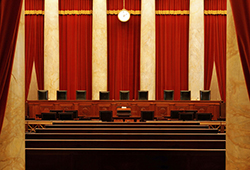 Addressing the America Invents Act proceedings for the first time, the Supreme Court’s decision in Cuozzo Speed Technologies LLC v. Lee largely maintained the status quo. The Court held that the Patent Trial and Appeal Board’s (PTAB) determination on whether to institute an inter partes review is not appealable in most cases and that the PTAB’s broadest reasonable interpretation standard in claim construction is proper.
Addressing the America Invents Act proceedings for the first time, the Supreme Court’s decision in Cuozzo Speed Technologies LLC v. Lee largely maintained the status quo. The Court held that the Patent Trial and Appeal Board’s (PTAB) determination on whether to institute an inter partes review is not appealable in most cases and that the PTAB’s broadest reasonable interpretation standard in claim construction is proper.
On the appealability of institution decisions, the Court left an opening for further challenges. The majority emphasized that no appeal is available on grounds “closely tied to the application and interpretation of statutes related to the Patent Office’s decision to initiate inter partes review.” Appeals based on constitutional issues, other statutes, or interpretive issues beyond the scope of the institution statute 35 U.S.C. § 314 may still be viable. The Court noted in dicta that PTAB actions may be reviewable for misconduct in an inter partes review under 35 U.S.C. § 316 or under the Administrative Procedures Act.
On claim construction, the Court found that the broadest reasonable interpretation standard was a reasonable exercise of rulemaking authority given that the statute did not proscribe a standard. The Court distinguished inter partes review from judicial proceedings in several ways, including the different evidentiary standards and the lack of a standing requirement for inter partes review. The Court held that these differences and the legislative purpose indicated that “Congress designed a hybrid proceeding” and expressly delegated authority to the Patent Office. Accordingly, Congress or the Patent Office may modify the standard, but not the courts.
Big Molecule Watch will continue to track litigation impacting the biosimilar space, so check back for the latest news and analysis.
